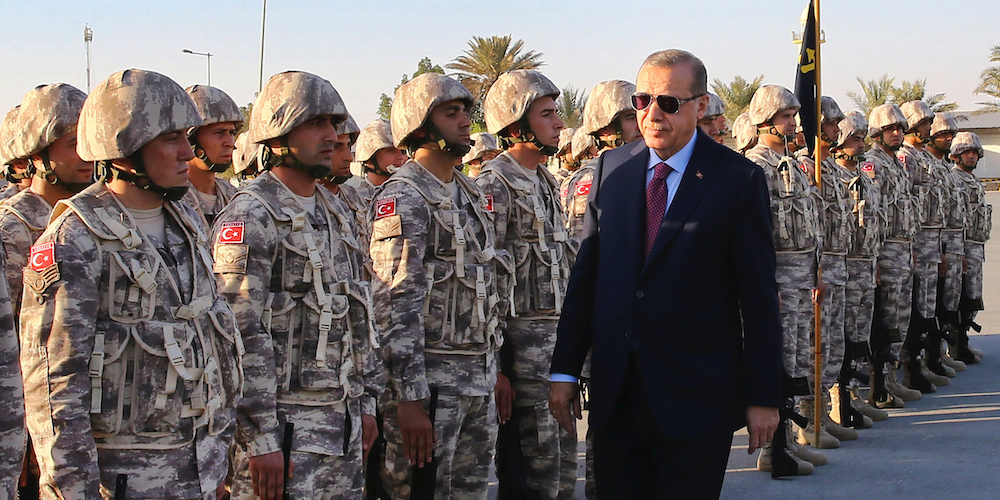- US sanctions have gone into effect against Turkey nearly a week after it began air and ground operations in northeastern Syria.
- The sanctions – against Turkey’s steel exports to the US and putting the brakes on a trade deal between the US and Turkey – aren’t hurting Turkey’s economy thus far and appear not to have dampened Turkish President Recep Tayyip Erdogan’s determinatino to follow through with his assault.
- “The only thing that will stop them is if the regime or the Russians move in significant numbers to where they stop,” according to one expert.
- Visit Business Insider’s home page for more stories.
After days of harsh rhetoric, President Donald Trump announced Monday that the US would impose sanctions on Turkey – but these are just a slap on the wrist for Turkey, which continues its incursion into Syria.
Trump threatened to devastate Turkey’s economy in an Oct. 7 tweet, saying, “As I have stated strongly before, and just to reiterate, if Turkey does anything that I, in my great and unmatched wisdom, consider to be off limits, I will totally destroy and obliterate the Economy of Turkey (I’ve done before!)” But the sanctions do not appear to have affected Turkey’s struggling economy, and haven’t slowed Turkey’s movement into Syria.
The economic costs of the sanctions are “minimal” at this point, tweeted Amanda Sloat, a senior fellow at the Brookings Institution who’s an expert on US policy towards Turkey. She explained that the important focus would be against whom the sanctions were levied; in this case, Turkish interior, defense, and energy ministers.
Unclear effect of Trump’s consequences on #Turkey. Econ costs minimal at this point, given limited trade talks (meant to incentivise S400s) & previous tariffs, with threat of more. Big question is which Turkish officials are designated. https://t.co/R9lAYmdD1B
— Amanda Sloat (@A_Sloat) October 14, 2019
Erdogan has repeatedly said that Turkey won't be stopped in its Syrian invasion; last week, Erdogan said in a speech that Turkey "will never stop this step. We will not stop no matter what anyone says," the Associated Press reported - the same day Treasury Secretary Steven Mnuchin said that the US had planned crippling sanctions against Turkey, but wasn't yet putting them into effect.
Erdogan has not cowed in the face of rebuke, telling European countries who criticized his decision to invade Syria that he would send Syrian refugees living in Turkey into Europe. Even after the sanctions were announced, Turkish troops continue their march into Syria, with video showing Turkish-supported forces in the city of Manbij, where nearby US forces recently departed. US and Turkish troops had engaged in joint patrols there, Reuters reports, part of an effort to convince Erdogan not to invade.
"Erdogan is not going to be intimidated right now by sanctions, because he wants a cordon sanitaire," Ambassador Theodore Kattouf, president of Amideast, told PBS Newshour, referring to the proposed buffer zone that Erdogan wants in northeastern Syria. "And it won't take him forever to get that done."
Turkey wants to establish a so-called "safe zone" along the Syria border with the intent of resettling millions of Syrian refugees. The country views Kurdish soverneigty as a threat and is wary of the People's Protection Units, or YPG, because of their ties to the Kurdistan Worker's Party that Turkey and the US consider a terrorist organization.
So far, the sanctions seem to be having little effect on Turkey, either militarily or economically, although the US has threatened further sanctions and called for an immediate ceasefire.
According to The Financial Times, the Turkish Lira was actually up against the dollar on Tuesday after sanctions - including a return to 50% tariffs on Turkey's steel exports and stopping "a $100bn trade deal" between the two countries - took effect.
Maryland Sen. Chris Van Hollen, a Democrat who along with Sen. Lindsey Grahan (R-S.C.) suggested much stronger sanctions against Erdogan and the Turkish military last week, called Trump's sanctions "pathetic," adding that Trump still plans to meet Erdogan in November. According to the Department of Commerce, Turkey's steel exports to all countries only account for 7.6% of its total exports, and the US market made up 5% of Turkey's steel export sales.
Pathetic response. Steel exports to the U.S. are only 4 tenths of 1% of Turkey's exports. And while Trump “talks” about sanctions on Turkish officials, he still plans to meet Erdogan next month. Congress must stay the course and enact tough sanctions that impact Turkish conduct. https://t.co/6lOlXjbrXt
— Senator Chris Van Hollen (@ChrisVanHollen) October 14, 2019
But it's unclear if further sanctions will stop Turkey's invasion, as Aaron Stein, director of the Middle East program at the Foreign Policy Research Institute told Reuters.
"The only thing that will stop them is if the regime or the Russians move in significant numbers to where they stop."

